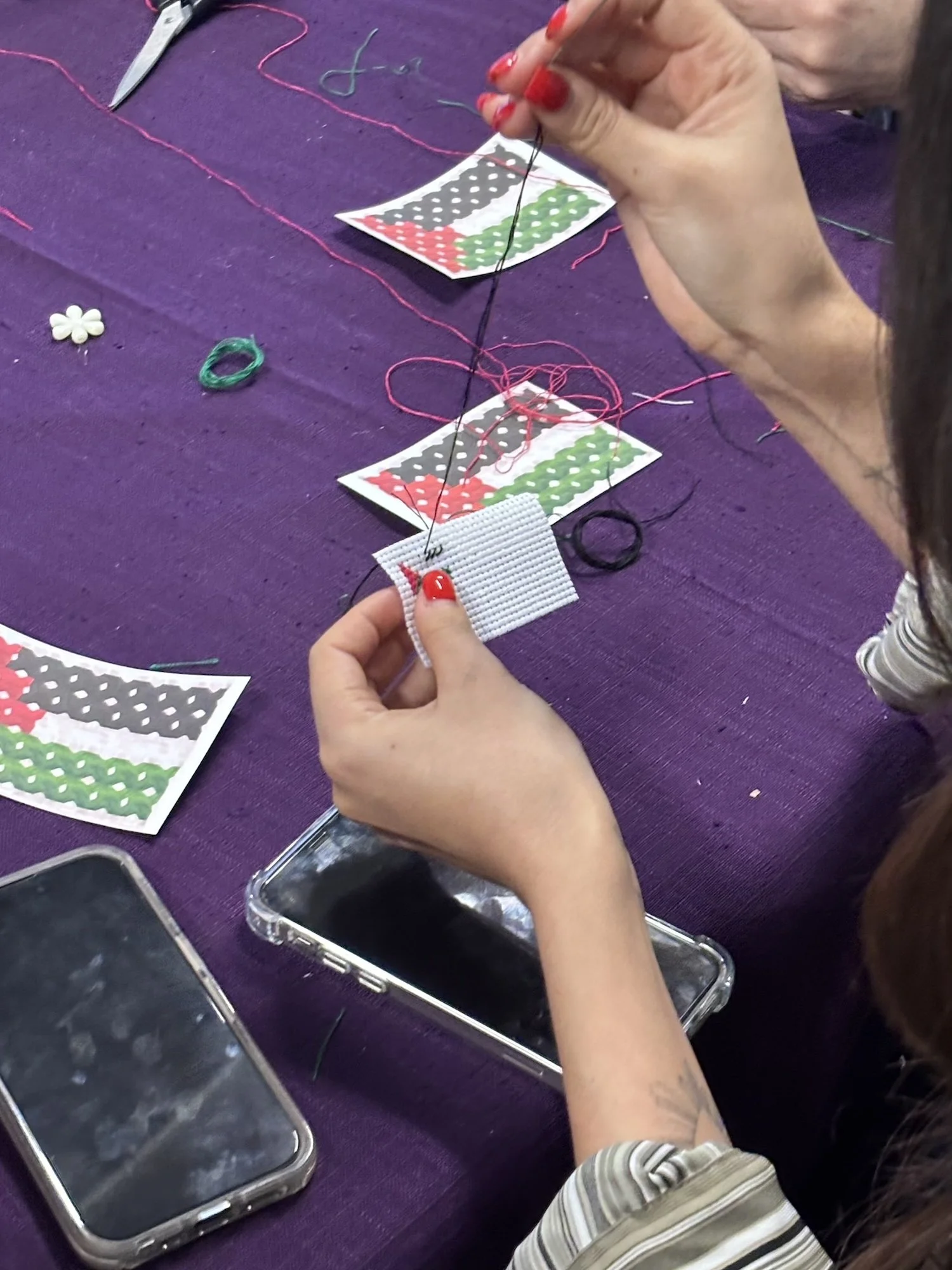Meet November's Featured Artist: Les Ramsay
/Les Ramsay’s “You Go Disco & I’ll Go My Way” via Galerie Antoine Ertaskiran. Photo by Paul Litherland.
My inbox hosts a small variety of curious objects: A seashell elephant, photographs of fabrics folded together in a potent cacophony of colour, and an impressive collection of ceramic animals. My favourite: a fuzzy photograph of a crochet poodle with a tiny black bow around its neck, containing a roll of toilet paper. Consider this a portal into Les Ramsay’s material sense of humour, and by extension, the attitude of his paintings. Objects are plucked from their domestic contexts and forged together in an explosive mix of kitsch and formal abstraction. As he tells me, he is “often surprised that what doesn't go together perhaps maybe does go together” and that “the physical differences and histories of textiles can bring [him] to interesting places” (emphasis added). The environments he spins on the surfaces of his works reflect the wit and temperament on which he angles his process. As he explains, “I’m big on trying to out-weird myself, I need that challenge or else it's easy for things to become just decorative.”
The concept of “fabric assemblage” is not a novel one, though applied to Ramsay’s work, it is almost too much of a simplification. His compositions eschew categorization in that they offer an escape route from what is familiar or expected. Take for example “The Perpetrator” (2016): a heady composition that riffs on 80’s interior design with it’s satisfyingly pink spread of order and cohesion. There is a visual kinship between the cat needlework, the corduroy, and the IKEA pillowcase; a sample swab of the ruptured confines between grandma’s apartment, domestic cliches, and seasoned contemporaneity. Then there is “Penelope” (2015), the 72” by 54” fervent riff on landscape painting with it’s slab of thick terry cloth and defining embroidered seascape. The needlework in this, he explains, "was in the VGH Thrift below my studio on Broadway and Quebec for a while, I would gaze at it all the time passing through, but I finally caved in and bartered with them...I got it for maybe $25? It hung in my studio all spring 2016 as inspiration, until one day the right colour combos in the studio appeared, and it was time to use it. “Penelope” came together magically.” Working outwards from these found pieces offers Ramsay unexpected narratives. It’s all a kind of intuitive coupling.
“Perpetrator,” 2016. Fabric collage, via Galerie Antoine Ertaskiran. Photo by Paul Litherland.
Lying in wait at the kernel of these works, and certainly many others, is the keen sensibility of a talented painter with a needle-sharp sense of humour. “Humour has big part in my attitude towards materials and how I decide to put them together,” he explains, “if something’s funny already, like a pattern or a needlepoint of a dog, they need the right partners around to develop a sense of reference, or at least leading the viewer to imagine their own punch line.”
Mined objects range dramatically from kitsch to camp to high cultural iconography, which Ramsay cleverly folds together. His new embroidery study paintings (“24 And There's So Much More,” 2018) further collapse trope with sophistication, high with low, nimbly outsmarting contexts and boundaries.
“24 And There's So Much More,” 2018. Oil on canvas, via Les Ramsay.
Removed from their original frameworks, objects in Ramsay’s work don’t just become clues to their origins, but part of new and kinetic stories. Irony, humour, and poignance—it’s an honest reflection of the absurdity of the visual worlds we inhabit. “Wonders of the Summer's Restless Slumbers,” his newest and most active work, presents the underlying connective tissue that there is something distinctly self-aware about the paintings that Ramsay makes, be it from the self reflective titles, the playful brush strokes, or in the way he can toss a charming retort like “pretty metaphoric, a bit cliché, kind of like my work,” my way.
“Wonders Of Summer's Restless Slumbers,” 2018. Fabric assemblage with acrylic.
Confronting a cliche head-on does more to address the timbre of language, of expression, then to simply ignore it, and for this I appreciate his work the most. Boldly wade into the absurdity of ceramic cats, toilet paper poodles, loose painting and fine embroidery.
“Sweetness in the Air,” 2018. Fabric assemblage with acrylic.
Learn more about Les Ramsay at artsy.net.










